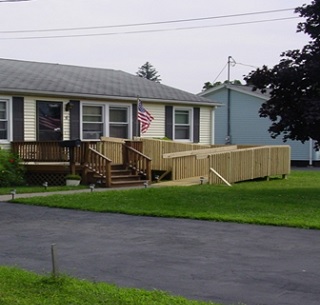Visitable home design relates to the principle that a person with a physical limitation will have the ability to “visit” anyone whose home is built using this standard. Presently, the majority of housing in Cortland County has at least one step to enter the dwelling and often the doorways and main floor facilities are not designed for use or navigation by a person with a physical limitation. This presents a challenge, not only for the person who may be visiting the home of their friends or family, but also for the homeowner who may wish to reside there even after acquiring a disability due to age or injury.
Visitability is not a new concept. In 2005, the City of Auburn adopted Ordinance No. 12-2005 Chapter 126 on Barrier Free Construction which requires visitable-style standards when developing new housing using public funds. In 2002, the Onondaga County Legislature and the City of Syracuse Common Council passed resolutions in support of visitable home design; they reiterate the benefits and community-value added by implementing such policy. We have attached copies of these documents, as well as a Visitability Fact Sheet, for your reference.
While no statutory requirements presently exist mandating new structures be constructed to provide access for people with disabilities, the unfortunate fact remains that people with disabilities are often isolated in their own homes or in nursing facilities away from their families and friends. More than simply supporting visitability features, requiring or incentivizing these features would contribute to a more livable Cortland County. Consider this, visitability would:





